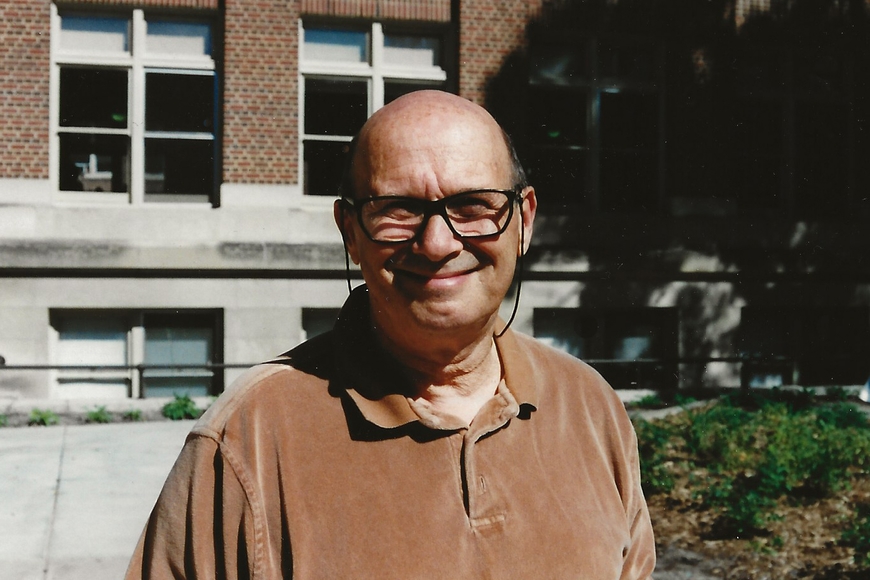Remembering Professor Marty Roth
Professor Emeritus Marty Roth died in Vancouver, BC, in October at the age of 87, surrounded by family. Long before “radical hospitality” was a trend, Roth embodied it, say his former colleagues in the Department of English. "Marty and [spouse] Martha Roth were a team in welcoming new faculty to the department,” Regents Professor Madelon Sprengnether notes. “They held a dinner party for each of us to introduce us to their colleagues and wider social circle—the beginning for me of a deep and warm friendship with them both.”
“Marty was a friend to the quirky, the non-normative, the strange,” describes Professor Emerita Maria Damon. "He and Martha together hosted many a departmental orphan at holiday feasts, and through them I met a lot of Twin Cities originals. He was my official department ‘mentor’ and a dear, wonderful friend. And what a great sense of humor, what a great, unorthodox mind, what a treasure.”
A scholar of American literature, Professor Roth joined the department in 1965 after receiving his PhD from the University of Chicago. Among his first books was the well-received Comedy and America: The Lost World of Washington Irving (1975), but his scholarship soon ranged beyond the conventional topics of his field, exploring film and cultural studies. In 1994, he published Foul and Fair Play: Reading Genre in Classic Detective Fiction (University of Georgia Press) and, in 2005, Drunk the Night Before: An Anatomy of Intoxication (University of Minnesota Press).
“His insights were unusual and different,” says Professor Emerita Shirley Garner. “He also had a striking sense of humor, which often caught you by surprise.”
“What Martin brought to the Department was perennial curiosity about texts and writers and ways to read and teach literature,” says Professor Emerita Toni McNaron.
He brought the same spirit of inquiry to the classroom, McNaron recalls. “He liked to push students out of their comfort zones,” she says, “even as he supported them in their discomfort over inhabiting new intellectual territory.”
Notably, Roth himself did not flee from intellectual discomfort. When colleagues Garner, McNaron, and Sprengnether organized a feminist research subfield in the department, challenging the discipline to open up its canon to women writers and its classics to feminist interpretations, he chose to become a student of the new perspectives. “Learning how to teach American literature from a gendered playing field took a little time,” he remembered in a 2008 interview. “I learned mainly from many of the wonderful books and essays that started to come out in the mid-‘70s.”
A longtime instructor of the department’s “American Women Writers” course, Roth also taught classes on Willa Cather and Edith Wharton, the cult of motherhood, Hitchcock and Chaplin, and addiction, intoxication, and culture, among other topics. “I regarded Marty as a model of political and academic integrity,” says Sprengnether. “He was highly revered as a scholar and much beloved as a teacher." (Roth’s wife, the editor and writer Martha Roth, collaborated with Garner, McNaron, and Sprengnether to create the pioneering feminist review Hurricane Alice in 1983.)
A native of Toronto, Canada, Roth was born to parents who had immigrated from Poland and Russia, his father an entrepreneur with his own sportswear company. After retirement in 2002, he and Martha emigrated to Vancouver, BC, returning to the country of his childhood. Stepping away from university teaching did not result in a diminishment of Roth’s academic activity. Over the next two decades, he published four of what he called “cultural geographies”: The Cultures of Memory: Memory Culture, Memory Crisis and the Age of Amnesia (2011); The Life and Death of Privacy in the West: The Ethnography of a Social and Aesthetic Concept (2012); Trickle and Flow: Chapters in the History and Culture of Water (2016), and Change Partners: Motion, Becoming, Difference, Violence (2018). A fifth, The Face: A Cultural Geography, is forthcoming (all titles Academica Press).
Roth also published numerous journal articles on topics from Mark Twain and Hawthorne to teaching 9/11 and radical Jewish culture. He regularly contributed to Jewish Currents and was a longtime member of the editorial board of Dionysos. “We spend our time reading, writing, and rallying for environmental justice and the Palestinians,” Professor Roth said of retirement in a 2018 interview.
“Marty was one of the first people I got to know when I arrived in Minnesota,” Professor Michael Hancher recalls. “For decades he strengthened the conscience of the department—earnest, critical, and yet forward-looking and optimistic. His many scholarly publications, both before and after he retired, show the same energy and care. We are diminished by his loss.”
“Though he seldom suffered fools, Martin had a big heart as well as a finely-tuned brain,” says McNaron. “Those of us who counted him friend as well as colleague felt that warmth coming our way often.”
Professor Roth is survived by wife Martha; daughter Jennifer and son David; and five grandchildren. A daughter, Molly, died of cancer in 2016. The Department of English offers deepest condolences to his family, friends, and colleagues.



